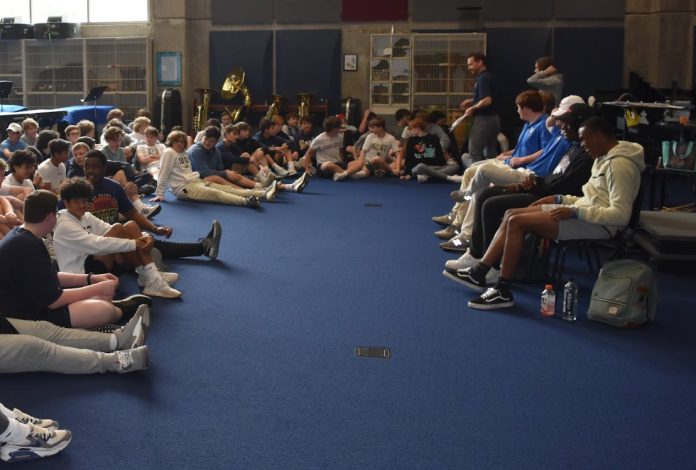During the spring of every year, the Sophomore class spends a Wednesday in March participating in a year-long tradition: the Sophomore retreat. All grades in Jesuit have their own retreat experiences, with some occurring at later (or earlier) dates than others. However, they each differ in the experiences offered to the students. For Sophomores, the themes are about their newfound experience at Jesuit and the responsibility they carry as they transition to Junior year. The social teachings of Catholicism and the story of St. Ignatius of Loyola offer sophomores time to reflect on their faith and relationships with their peers and the faculty. Sophomores are divided into small groups and the day is spent with others in discussion and reflection on their year so far.
Interviews with Faculty
To better understand what the planning of the Sophomore Retreat was like from a faculty perspective, I had a few interviews with Faculty members Mr. Ornelas, Mr. Williams, and Professor Pinto.
Mr. Williams
Mr. Williams is a Sophomore Counselor who helped organize the Sophomore retreat. He also coaches the JV soccer team and teaches English.
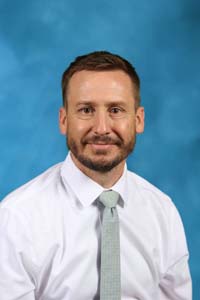
How many weeks before the Sophomore Retreat did planning begin?
Right after last year’s sophomore retreat finished, Mr. Ornelas and I wrote down feedback from students and evaluations from other faculty. We jotted stuff down we needed to remember for next year, but because of the busy fall semester, we usually start preparing for the retreat in January.
How was this year’s retreat different from the retreats from the last two years?
Last year was really tricky because we didn’t have a sophomore retreat in 2022. We didn’t get to run a retreat that year and we had to stay home because of COVID. So last year the administration came up to us and asked what it would be like to run a sophomore retreat on campus. We thought “let’s try it” and started from scratch. We started from the bottom up and kept some main concepts like Ignatius’ story. We decided that if it was going to be o campus we needed to make it engaging and active. We didn’t want it to be another day of school.
How did you organize the collaboration with other faculty members?
First of all, I wanted to say that my colleagues did a great job. They have a lot of wisdom that may sometimes be untapped because of the specific subject they teach, but they’re also human beings with experience too and they can share those experiences about their spirituality and faith. Showing my teachers in a new light is important for our students. I give them a basic summary of the context of the day and the goals of the activity. After a few weeks, they’ll tell me their ideas and we can talk about the activities. But I won’t hear their speeches until the day of the retreat. We have some faculty members who’ve done this for a few years, and some who have only been to one sophomore retreat. They’ve all conducted great speeches and organized fun activities.
Professor Pinto
Professor Pinto teaches Spanish at Jesuit and organizes the annual service immersion trip to Peru. He was also my Sophomore Retreat small group leader and spent the day participating in the retreat alongside his students.
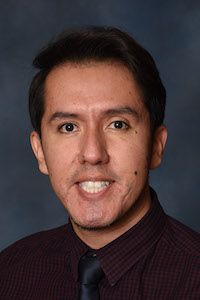
What was your goal as a homeroom teacher during the sophomore retreat?
We are trying to have opportunities to work with our students through these wonderful activities that help our students connect to learn about each other. It’s important for our students to have deeper connections with their classmates, and I think it’s amazing to see it happen. This is my second time doing this, and we had Mr. Williams and Mr. Ornelas organizing the event and preparing a lot for this retreat.
You talked about the value that the students got from it, what value do you think you attained from the retreat?
I think it’s important to know more about personal things like what our students are thinking and the troubles that they have. I also think we’re connecting at a different human level because then they realize that sometimes with those open questions that we have and discussions on the struggles we are having right now they can connect with teachers as well. It makes the teacher-student bond stronger and makes teachers more relatable because students know the feelings and experiences of teachers and vice versa.
So do you volunteer to be a homeroom teacher during retreats?
We volunteer as a group of teachers and have meetings together with the sophomore counselors throughout the year just to discuss what we should do during the retreat. We also talk about things that are working with the students or the things that we need to have a perspective on. It’s fantastic to work with the other faculty.
How many weeks before the sophomore retreat will the faculty be preparing?
I think that the process started last year with the feedback from last year which we used to make some changes to the retreat. It’s based on the different feelings and feedback from Jesuit students. As Jesuit educators, we are supposed to continually have discussions and to get feedback from our students to improve. It helps a lot to receive feedback so we can improve the retreat.
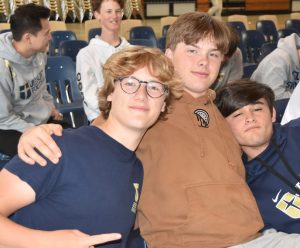
Mr. Ornelas
Mr. Ornelas is a sophomore counselor at Jesuit Dallas and helped organize the sophomore retreat with Mr. Williams.
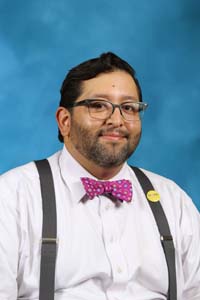
Mr. Williams described how the preparation for the Sophomore retreat occurs after the previous year’s sophomore retreat once feedback has been solicited. What are some of the lessons you took away from the 2021 Sophomore Retreat?
We learned that we always need to figure out what the classroom needs in regards to growth and their spiritual development, especially on where the sophomore class is mentally developing throughout the school year. Looking at the lifespan age (lifespan age is a term used by counselors to denote the periods of a person’s life, such as infancy or young adulthood) of adolescents we figured out new ways, old ways, or ways to modify activities that would reflect what the sophomore class needs. We started off with questions like “How was the schedule, what was the timing, what worked, did it feel rushed?” We try to focus on a lot of 1 on 1 discussion because I feel that some classes might benefit from 1 on 1 time compared to other classes that may need more communal discussions. We always look back on the current year’s retreat to learn how we can make it better for the next year’s sophomore class. So it’s a long step process but overall I think it benefits a lot of sophomores. When I was a sophomore in 2001, some of the activities we did are still being conducted today and some of the activities are brand new. We really enjoyed the activities with the class and wanted to foster creativity in the sophomores. The more creative that we can be with the students then the more they can take away from the retreat.
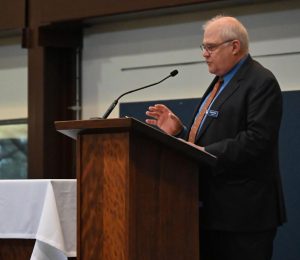
You mentioned having your sophomore retreat in 2001. How long has Jesuit been doing sophomore retreats?
I think they’ve been doing these since the start of the school but in the way that we see them, they’ve been doing those in the 1980s. When I was a student here there were freshmen, sophomore, junior, and senior retreats. We also had the Kairos retreat too.
What were some of the goals for this year’s sophomore class regarding sophomore class?
Creativity, I’m going to say that right now. Creativity because we had to be mindful of the fact that the students have been living the past two years in the pandemic. There have been a lot of changes in the past two years in regards to space, in regards to working together, being limited in schools and the masks. A lot of kids didn’t get to have their 8th-grade retreat and had a freshmen retreat impacted by COVID. We wanted to create more of a communal aspect by utilizing more creativity. We tried to create new events involving new faculty members speaking like Mr. Goll, and new activities that involved competition. There were things we could not do because we were limited in space in time that we normally would have done on the campgrounds in years before that we’re now doing at Jesuit. Before COVID, we would go to Camp Copass where we would do our daily retreats. For this class we were looking for creativity, connecting, and having that time away from academics even though we were on campus.
You mentioned Camp Copass, what was that like when Jesuit used it?
Camp Copass was used 3 years ago before the pandemic. In March of 2020, we didn’t have the sophomore retreat because of COVID. Camp Copass is located in Denton TX and we went there for many years, we would take the sophomore class and do mass. Camp Copass is pretty big with a chapel, a games course, and a mini put put golf course. They also had a rock climbing course and it was always funny when students would ask “can we use that?” and we would have to say “no we’re going to focus on the communal aspect of the retreat.”
What are some big takeaways from this year’s sophomore retreat?
I think we’re going to evaluate and see the timing, and how much we need in a retreat. We hear about how some people want to be more active. A big takeaway is to be mindful of the timing of activities. Another takeaway is the input from students, faculty, and leaders so that way we know what we should do to offer for next year. A big takeaway for me is just knowing that it’s an exciting day but how do we set up that exciting day if we could use a guidance period or a class period beforehand so we can reflect on it and then go into it. I think sometimes students aren’t sure what’s happening and are just letting the day run, and some students want to know what to expect.
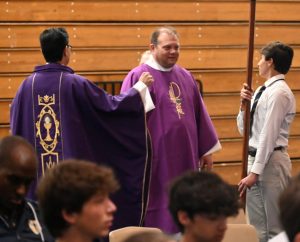
A Sophomore’s experience in the retreat
As a sophomore who participated in the retreat, I thought that the day struck a perfect balance between exciting group competitions, self-reflection, group discussions, and lessons learned from faculty speakers. As I enter into the more complicated and chaotic Junior year, I’m glad that I had the chance to experience a relatively normal Sophomore retreat.
Here’s what some other sophomores had to say about the retreat and how it impacted them:
“The Sophomore Retreat was pretty fun, but it also let me see some problems that I went through early in the year, and some problems other sophomores probably went through or were currently going through. It helped me come to terms with, the now obvious idea that I’m not alone in my struggles and that I have not just my family and loved ones to rely on, but also the entire Jesuit community. That revelation was reassuring, to say the least.” – Henry Casey
“To me, the main takeaway of the sophomore retreat was opening up to people. We started with small conversations and talked with other people. Over time we were talking to people we didn’t know and had to be comfortable with any mistakes we made, or the feelings of embarrassment or nervousness. Then we had activities in front of the whole school to foster a sense of community and open up to others. These activities were hands slowly guiding us to being comfortable with lettings others know more about us. It really opened me up to others and vice versa and made my classmates more relatable.” – Alec Tison

“The Sophomore Retreat was a memorable one, it allowed the sophomore class to take the story of Saint Ignatius, reflect upon it, and think about how we may take aspects of his life, and apply them to ours. The retreat was a great experience for the sophomores as it allowed for an exciting continuance of the spiritual development of the Sophomore class into men for and with others.” – William Spicer


